Here’s what’s happened throughout Alliance’s 25-year history – and what we published alongside these historical moments
Since its launch in 1996, Alliance has dealt with many themes through its special features which look in depth at a particular topic. Here, we offer a bird’s-eye view of some of those themes, through a selection of the magazine’s issues, chosen by a readers’ poll.
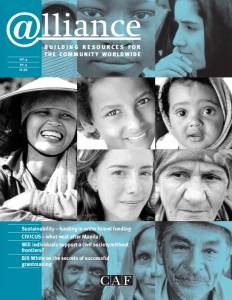 December 1999: Funding Sustainability
December 1999: Funding Sustainability
‘An organization that depends on its own society for support will think and act very differently from one that plays the aid system.’ David Bonbright on the grantmaker’s paradox of the quest to become redundant. He proposes four steps to allow grantmakers to come to terms with this: develop a sense of irony, understand what sustainability is, talk about it and fund sustainability inputs.
Ashoka’s Citizen Base Initiative grasps that the growing number of citizens’ organisations need to be funded by citizens themselves. Trust is the word…in Ecuador, local trust funds are making loans to allow members of local peasant associations to set up their own broomstick factories….
From toddler to child – CIVICUS’ third World Assembly in Manila marks a developmental stage for the organisation.
What was happening in the world?
1999
In January 1999, the Euro currency was launched. A few months later, the J18 anti-globalisation protests launched in a number of cities across the world, and Nelson Mandela stepped down as the first Black president of South Africa.
2000
The Millennium Development Goals are launched this year.

Ground zero, New York City on September 11, 2001. Image credit: Eric J. Tilford/U.S. Navy.
2001
The 9/11 attacks on the Twin Towers in New York City set the world on a different course.
2002
The African Unity is disbanded and replaced by the African Union. In our issue published that September, Graca Machel, Mozambique Foundation for Community Development says: ‘We in Africa have to start mobilising African resources, no matter how small the sums are.’
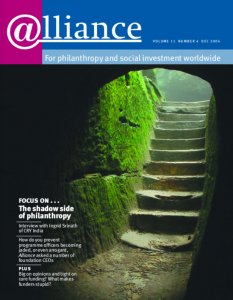 December 2006: The Shadow Side of Philanthropy
December 2006: The Shadow Side of Philanthropy
What is discussed and what is left unsaid in philanthropy? The seeming generosity of philanthropy can mask patronage, patriarchy and a history of oppression.
‘The greatest shadow in organised philanthropy’ is that ‘the country with the largest philanthropic establishment has the worst record among industrial countries with respect to health care, education and other basic services.’ (Michael Lerner and Nilda Bullain). The two guest editors also contend that the conservative revolution is ‘unquestionably the greatest achievement of systems-change philanthropy in modern history.’
Donors ‘do not understand how indigenous people think…nor do they understand the simple fact that imposing Western ideas is the antithesis of effective philanthropy.’ (Rebecca Adamson)
[A small typographical change, suggestive of a change in attitude, has come about in the meantime. By the publication of the special feature in 2020, indigenous peoples have become Indigenous Peoples].
‘I have yet to come across a donor who would genuinely and in a transparent way involve its grantees in its own evaluation and strategic planning process.’ (Nilda Bullain)
….And the news that Muhammad Yunus became the first Bangladeshi Nobel Peace laureate.
What was happening in the world?
2004
Mark Zuckerberg creates the first version of Facebook, available only to students at Harvard University. In September, Kavita Ramdas at the Global Fund for Women says to Alliance: ‘… any philanthropy that is truly about social change has to be willing to fund the very things that might make it impossible in 10 or 20 or 30 years for any one individual to amass the wealth of a Bill Gates or a George Soros.’
2006
Twitter launches, and Wikileaks is founded. The UN General Assembly votes to establish the UN Human Rights Council.
2007
An IPCC report concludes climate change is ‘very likely’ to have a predominantly human cause. In September, Uday Khemka at the Nand and Jeet Khemka Foundation in India says: ‘We were shocked to find we could not identify a global network of funders around climate change.’
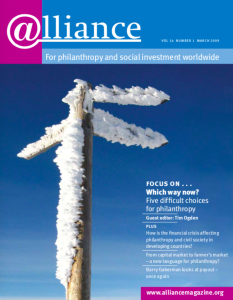 March 2009: The Next Decade of Debate
March 2009: The Next Decade of Debate
‘From both/and to either/or’ says Timothy Ogden….As the financial crisis bites and belts are tightened, five areas where funders are likely to have to make difficult choices are debated – climate change, education, health, public policy on philanthropy, and evaluation – for and against by those working the various fields.
Should foundations increase their payout rate during times of economic crisis, asks Barry Gaberman? So long as the decision is made by individual foundations, not by the state or peer pressure.
Commentators from around the regions offer their views on the effects of the financial crisis on the non-profit sector….
And Adrian Lee takes an early look at the use of social networks to raise philanthropic funds.
What was happening in the world?
2008
The sub-prime mortgage crisis and bankruptcy of Lehman Brothers trigger the worst financial crisis since the Great Depression. In China, an earthquake near Chengdu leaves an estimated 60,000 dead and up to 5 million homeless.
Steve Gunderson at the Council on Foundations in the US reflects on the influence of the philanthropy sector, saying: ‘One of the emerging trends in the US over the last year is the recognition philanthropy can and should play in advocacy.’
2009
In Sri Lanka, the civil war ends after 25 years.
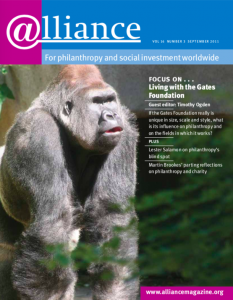 September 2011: Living with the Gates Foundation
September 2011: Living with the Gates Foundation
‘Whatever one’s view of its operation, it is clear that the Gates Foundation is absolutely unique…it has pushed well past the boundaries of traditional foundation behaviour.’ (Edward Skloot)
Whether that uniqueness is good or bad divides contributors to this issue as it does the wider foundation world:
‘Gates’ expertise and knowledge and measurement provides much-needed capacity to the grantees it funds.’ (Lena Baumgartner, New Philanthropy Capital)
‘People are impressed with the donor, they see the strategic work, but they find the size of the organisation and wonder about issues of power.’ (Michael Alberg-Seberich).
‘I think the commitment of [Gates] foundation has been essential and has motivated a lot of other donors to get involved [in GAVI]’ (Amanda Glassman, Center for Global Development)
‘When a famous successful person starts behaving as a preacher, things just start to go wrong,’ (Dmitry Zimin)
….the issue also announced the sad news of the death of emerging market philanthropy practitioner and bridge-builder Olga Alexeeva.
What was happening in the world?
2010
The attempted suicide of a Tunisian street vendor triggers the Tunisian Revolution and the wider series of protests known as the Arab Spring uprising.
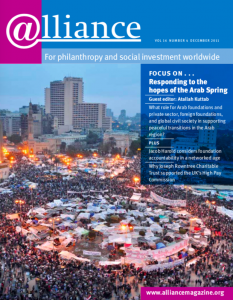 December 2011: Responding to the Hopes of the Arab Spring
December 2011: Responding to the Hopes of the Arab Spring
What role can and should philanthropy play in reshaping Arab societies in the wake of the 2011 uprisings? ‘Arab philanthropy is being reclaimed and not simply labelled Islamic philanthropy…..being responsive to people’s needs requires philanthropy to leap forward in synch with society. If it moves at its own pace it risks becoming irrelevant.’ (Atallah Kuttab, SAANED)
‘a new level of transparency in donor-grantee relations,’ will be needed (Kuttab) ‘Western foundations will require local guidance to ensure what they are offering fits local needs rather than the donor’s agenda.’
Thomas Carothers of the Carnegie Endowment for International Peace, meanwhile, warns that though the risings called up memories of the revolts in Central and Eastern Europe 20 years earlier, ‘those seeking to assist transitions in Arab countries should approach analogies with caution.’
And the place of rights in the development of Arab countries?
‘in order for people to achieve comprehensive and sustainable development, all human rights must be enjoyed.’ (Fateh Azzam, Arab Human Rights Fund)
Elsewhere, the High Pay Commission in the UK, funded by the Joseph Rowntree Charitable Trust published its initial findings in May: ‘the project is politically a bit dangerous….it was a risk for JRCT, too, because it was open-ended and we were going into uncharted territory.’ (Deborah Hargreaves, Chair of the Commission).
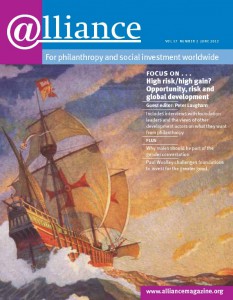 June 2012: High risk/high gain? Opportunity, risk and global development
June 2012: High risk/high gain? Opportunity, risk and global development
Another perennial in philanthropy’s back garden, Peter Laugharn guest edits an issue that wonders how much risk foundations should take, why they are often reluctant to do so and what is risk for philanthropy anyway? Human rights lawyer Brian Currin and Stephen Pittam of the Joseph Rowntree Charitable Trust, which supported much of Currin’s work in Northern Ireland and the Basque Country are featured, along with Richard Branson, Ingrid Srinath and Aryeh Neier of OSI.
‘Philanthropy implies change. After all, we don’t fund to keep things as they are. Therein lies the risk.’ (Aryeh Neier, OSI)
The risk for foundations is not about losing grant dollars…..it’s about not realizing the potential of those dollars,’ (Zia Khan, Rockefeller Foundation).
The biggest risk to foundations is that they become irrelevant because they don’t tackle the big, long-term issues.’ (Johannes Meier, European Climate Foundation)
Observers from around the world offer suggestions on how foundations should operate to put their supposed risk capital to best effect, from partnership with multilaterals and co-investment with other forms of finance to supporting movements of the disenfranchised to hold their governments to account.
What was happening in the world?
2013
Cardinal Jorge Mario Bergoglio is elected the first pope from the Southern Hemisphere. Later that year, former CIA employee Edward Snowden discloses operations engaged in by a US government mass surveillance programme.
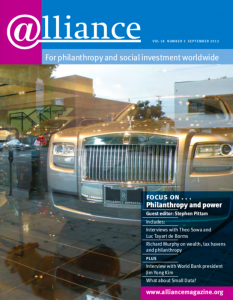 September 2013: Philanthropy and Power
September 2013: Philanthropy and Power
We’re not good at talking about power and because we don’t talk about it, we don’t learn to use it well.’ (Theo Sowa, AWDF)
‘When you have money that’s unfettered, you wake up in the morning and think you can change the world. This gives a false sense of power.’ (Suzanne Siskel, Asia Foundation)
Linda Guinee and Barry Knight distinguish between power with and power over.
Sophie Pritchard (EDGE Fund) introduces funders who involve communities in their grant decisions to varying degrees including Red Umbrella Fund, North Star Fund and Global Greengrants
And news that the Heron Foundation will move to investing all of its assets in its mission over the next five years; ‘We expect to be able to continue the foundation as long as poverty is a problem that needs to be solved.’ (Clara Miller, F B Heron Foundation)
‘When everyone else is turning their attention away, great foundations have stepped in to provide seed funding for critical innovations,’ Dr Jim Yong Kim, president of the World Bank on why he wants the Bank to work with foundations.
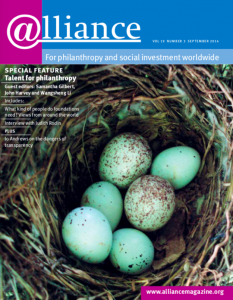 September 2014: Talent for Philanthropy
September 2014: Talent for Philanthropy
‘People: philanthropy’s great strength,’ is the title of the guest editors’ piece, but …‘As a global sector, have we really done enough to bring in, then hold on to and nurture, the very best? The short answer is: No.’ (Samantha Gibson, John Harvey and Wangsheng Li, guest editors)
Time to invest in recruitment, professional development, an enabling workplace culture and succession planning. They argue for a combination of dedicated academic courses and workplace training.
Luc Tayart: ‘foundations are knowledge companies, not a cash machine.’…their staff, rather than their money are their greatest asset.
‘We tend to hire people, not roles….as soon as someone stops learning in their job, it should be time for them to move on,’ (Carol Larson)
‘I hire first for attitude. I don’t care much for credentials.’ (Laurence Lien)
Pier Mario Vello (whose death was also mourned in the edition) argues that pursuit of ‘organizational excellence’ is a difficult task – ‘not for the faint of heart, those who are lazy, dull or lacking creativity; not for the pessimist, the rationalist, the bureaucrat, the envious, the cheapskate.’
Elsewhere, Louise Hallman and Nancy Smith raise the question of the philanthropic ecosystem, a notion which has come to enjoy wide currency since, and Uli Grabenwarter wants clearer measures of impact for social investment.
What was happening in the world?
2016
ICU and Suddeutscher Zeitung publish the Panama Papers. The UK votes to leave the European Union. Donald Trump is elected president of the US. An agreement between the Colombian government and FARC ends 50 years of civil war on Colombia.
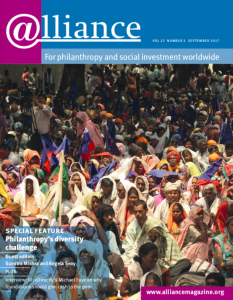 September 2017: Philanthropy’s Diversity Challenge
September 2017: Philanthropy’s Diversity Challenge
‘Philanthropy reflects the elites, not the streets’
‘Tokenism won’t do. Boards must be inclusive and encourage all members to engage.’ (Angela Seay)
‘White and wealthy’ – an Alliance survey among readers finds that ‘diversity is addressed through our grantmaking to a greater extent than internally,’ ‘we have a racially diverse staff but many of the senior positions are occupied by white people,’
‘Diversity, equality, inclusion – there’s a long way to go,’ conclude Floyd Mills and Natalie Ross of foundations in the US and, in the UK, ‘when it comes to class, absolutely nothing has been done’. (Jake Hayman)
Jo Chopra reminds us that ‘’Inclusivity’ includes disability, too’
Elsewhere, Michael Faye of GiveDirectly demystifies and defends cash transfers and the rise and spread of venture philanthropy and its future development are explored.
What was happening in the world?
2017
The US announces its decision to withdraw from the Paris climate agreement. The #MeToo movement spreads across the globe, following the news of Harvey Weinstein’s career of sexual misconduct.
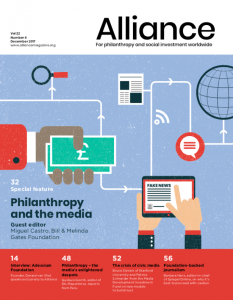 December 2017: Philanthropy and the Media
December 2017: Philanthropy and the Media
‘The Pursuit of Mutually Assured Survival’, heads guest editor, Miguel Castro’s article on this special feature of how the interests of philanthropy and public-interest journalism can align themselves.
‘A healthy democracy needs independent and trustworthy information. Here’s how philanthropy can help’
‘The lure of foundation funding cannot be allowed to endanger media’s credibility.’ (Barbara Hans, Spiegel Online)
‘The impact of philanthropic funding for independent journalism in Latin America has been enormous.’ (Gustavo Goritti, IDL- Reporters, Peru)
Tom Rosenthal and Kevin Loker offer rules of the road for non-profit journalism funding.
Oksana Oracheva and Barry Knight ask whether philanthropy needs ‘a new story’, in place of the old rich give to the poor trope. Maybe instead of one account, several ‘narratives based on economic, historic, cultural and technological differences that hang together in a configuration.’
What was happening in the world?
2018

Greta Thunberg in Colorado, October 2019. Photo credit: Anthony Quintano/Flickr.
15-year old Greta Thunberg undertakes the first School Strike for Climate outside the Swedish parliament.
2020
 In March, the World Health Organisation declares the Covid-19 outbreak a global pandemic. Lockdowns follow in many countries. In December, Alliance publishes an issue dedicated to global health philanthropy including an interview with WHO Director-General Dr Tedros Adhanom Ghebreyesus.
In March, the World Health Organisation declares the Covid-19 outbreak a global pandemic. Lockdowns follow in many countries. In December, Alliance publishes an issue dedicated to global health philanthropy including an interview with WHO Director-General Dr Tedros Adhanom Ghebreyesus.
‘I call on philanthropic organisations to please help us ensure a sustained investment in primary healthcare and emergency preparedness,’ said Dr Tedros.
In May, the murder of George Floyd by a policeman in the US triggers international protests and uprisings in the Black Lives Matter movement. In June, Alliance puts out an issue looking at philanthropy’s support of social movements across the globe.
2021
 Alliance turns 25, with a year-long celebration including special events reflecting on philanthropy past and present, coverage online and in our issues, and an upcoming 100-page 100th issue in September.
Alliance turns 25, with a year-long celebration including special events reflecting on philanthropy past and present, coverage online and in our issues, and an upcoming 100-page 100th issue in September.
Subscribe today to be sure not to miss it.
Andrew Milner is Associate Editor at Alliance.





Comments (0)